A Guide to the 5 Stages of Psychosis and How to Recover
Understand the five stages of psychosis, early warning signs, and treatment options to support recovery and long-term mental health.
A Guide to the 5 Stages of Psychosis and How to Recover Read More »






